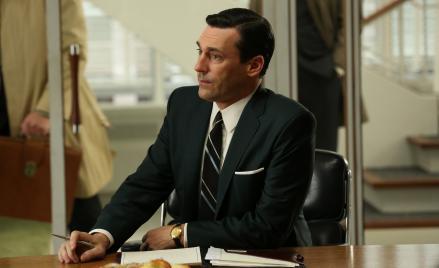Hanna, Seth,
There’s something genuinely sweet to Don’s secretary, Dawn, a moral core that is lacking in nearly every other character. Her description of SCDP is superb: “Everybody’s scared there,” she says. “Women crying in the ladies’ room. Men crying in the elevator. Sounds like New Year’s Eve when they empty the garbage, there’s so many bottles. And I told you about that poor man hanging himself in his office.” Oh lord, I thought, she’s right. What the hell is wrong with these people? It’s like some sort of soap opera in there.
I’m not sure how we’re supposed to perceive her. Everyone else in this show has a sword of Damocles hanging over them—a sword that they each hung there themselves. To watch this show is to experience a steady state of dread and exhaustion. It’s trickle-down cruelty and fear. And here is Dawn, cataloging that dread, acting slightly—very slightly—outside the pale (sorry) by punching out a fellow secretary’s time card, yet willing to own up to her moral failings. A self-interrogating, decent, vulnerable human being. On Mad Men. Why? The pure-hearted won’t last long in that hell.
Why does the black lady have to be so good? Yet her character does provide a valuable service: Reminding us that SCDP is, for many, a genuinely awful place. The badness filters down. And Don, who is the emotional core of SCDP, is not landing business. He keeps trying to sell absence to his clients: The hotel that isn’t there, the ketchup that isn’t there. And the clients aren’t having it. Heinz wants to see its bottle in the ads. And along comes Peggy to sell it. The thing here is that they are supposed to be selling ketchup. But the client wants the bottle.
As Seth points out, the design of these ads is perfect. These ads are more 1968 than 1968, down to the thick crinkle of the plastic sheet that Don pulls over his easel. We are entering years of whitespace.
Which should be perfect, because Don is an architect of absences. The man can’t help himself. His whole career he’s created spaces that others will fill. (So has, of course, Matt Weiner, by leaving so many questions open.) It’s in the gaps that we know the shape of a thing. That’s hardly a new idea: The 11th chapter of the Tao Te Ching reads “Clay is fashioned into vessels, but it is on their empty hollowness that their use depends.” Perhaps Don is attempting to pull off Taoist marketing?
Don thrives in the silences. The man creates a vacuum, and others are always trying to fill it. But suddenly that blankness is backfiring. Key people, for the first time in the show, are not trying to please Don. Peggy plows ahead with Heinz and Don listens at the door; Megan makes out on her soap opera and Don watches in the shadows, his face beady with rage. Even Harry Crane becomes, finally, an advocate for himself, claiming “ownership” of his secretary and storming the partners’ glass-walled fortress to demand a partnership (which he doesn’t get, but it’s clear he’s not going away).
It surprised me how important television—the medium itself—was to this episode. Television has made Harry Crane aware of his own power; television will be a balm upon the troubled brand of Dow Chemical; television, in the form of that wonderful hypersaturated soap-opera set, will cuckold Don. There was even, in the credits, a “Soap opera tech advisor” named Peter Levin.
The most interesting moment of the night came when a television writer and his wife in an open marriage try to seduce Don and Megan. This is the man who “owns” Berkshire Falls, the world-builder. He controls the economic reality of a fictional world, which has real-world ramifications. How amazing that the head writer of a soap opera would be portrayed (by Dynasty’s Ted McGinley!) as a creepy middle-aged man who wants to have sex with Don Draper, and who casts Don’s wife as a maid and then lets another man make out with her. Conclusion: It’s good Matt Weiner can laugh at himself. Or at us.
Don, used to setting the agenda, is lost in this malleable McLuhanist coolness. Television is eating Don’s world. He wants to sell white space above some french fries so that people will live with ketchup all day long. The man from Heinz wants the bottle. Both are selling something hollow, but it’s Don who believes. And the people around him just aren’t buying it any longer. Peggy is gone. Megan is furious. Dawn, a relative stranger, knows that the whole business is rotten; she sees the fear that holds the place together. And Sylvia does as well. She doesn’t pray for Don to visit. She prays for him to find peace.
As for Sylvia going up in the elevator? Well, I don’t know. I want her to have pigeons on the roof.
I am a writer, and I’m against the war,
Paul
